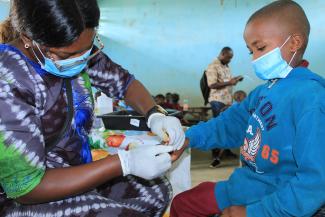USAID’s Neglected Tropical Diseases (NTD) program fights diseases that can be cured or prevented by distributing drugs donated by the pharmaceutical industry. Through NTD USAID provides critical funding that allows Cameroon to distribute drugs safely and efficiently and to increase the number of treatments until national coverage is reached.
The program prioritizes NTDs that can be controlled or eliminated through safe and effective treatment strategies and complemented by pharmaceutical donation programs. It also focuses on eliminating five diseases:
Lymphatic filariasis (elephantiasis)
Trachoma
Onchocerciasis (river blindness)
Schistosomiasis
Soil-transmitted helminths (intestinal worms)
Act to End Neglected Tropical Diseases/West Program:
Aims to eliminate or control five NTDs (trachoma, lymphatic filariasis, schistosomiasis, onchocerciasis, and soil transmitted helminths) in partnership with the Ministry of Health of Cameroon. Key activities include mapping disease transmission areas, distributing donated pharmaceutical treatments to communities at risk, and conducting impact and surveillance surveys to measure progress. Support also includes technical assistance, training, and complementary disease reporting.
Life of Activity: 5 years
Geographic scope: Adamawa, Central, East, North, North West, Far North, South West regions
Implementing partner: FHI 360 (Helen Keller International in-country)
The Coalition for Operational Research on NTDs (COR-NTD):
Focuses on removing the barriers to eliminate or control five NTDs (trachoma, lymphatic filariasis, schistosomiasis, onchocerciasis, and soil transmitted helminths). The specific project underway is entitled "slash and clear" whereby community directed removal of vector breeding grounds in the form of removing vegetation along rivers and streams is thought to remove biting black fly populations as an adjunct intervention to Mass Drug Administration (MDA) in reducing onchocerciasis. Currently the project is in a pilot phase to repeat experiments already published from Uganda which showed positive results. If those are repeated in Cameroon, the aim is to conduct a much larger multi-country study.
Life of Activity: 4 years
Geographic scope: Nationwide
Implementing partner: The Task Force for Global Health, University of South Florida, CRFILMT

